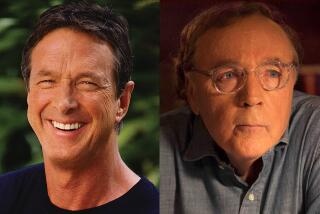The Thing From the Tar Pits : JURASSIC PARK <i> By Michael Crichton (Alfred A. Knopf: $19.95; 413 pp.) </i>
Michael Crichton, the doctor (Harvard Medical) turned novelist (“The Andromeda Strain”) turned moviemaker (“Coma”), is a worry wart, and like most excessively anxious people he feels duty-bound to make the rest of us as edgy as he is. His many novels and movies form an extended brief explaining why we, as a nation, race and planet, should have a serious case of the willies.
The theme that preoccupies him is nothing less than the hubris of man and the heedlessness of science. Our capacity for technological innovation, in his view, has outstripped our capacity to deal maturely with the power it affords, carrying us inexorably to the yawning abyss of annihilation. Crichton’s first novel, “The Andromeda Strain,” told the story of a life-as-we-know-it-destroying bacterium uncorked by money-grubbing scientists; likewise, his movie “Westworld” featured a rampaging amusement-park automaton (played by Yul Brynner) who turns on his feckless human creators and, Yul Brynner-like, pumps them full of hot lead.
Only time will tell whether Crichton’s worries about rampaging bacilli and deranged automatons are justified--even now, after all, an irritable Third World dictator is hoarding untold stashes of bacteria, and you never can tell when the talking Abraham Lincoln at Disneyland might go berserk during some matinee, lifting skirts and making rude noises with his armpits. But so far the Crichton prognostication average has not been good--zero, in fact. We should hope it stays that way. Otherwise, having read Crichton’s fat new novel, “Jurassic Park,” I have a word of advice for anyone owning real estate within 10 miles of La Brea tar pits: Sell.
What sets Crichton’s teeth to chattering these days is biotechnology, the manipulation of DNA to create new forms of life or--the premise of “Jurassic Park”--re-create old ones. The novel opens with a documentary-like sketch of how this new technology has come to be corrupted by slithery commerce. Once scientists were pure, disinterested; now they--unlike, say, the directors of sci-fi movies and the authors of pulp fiction--have lowered themselves to making a buck. “Suddenly,” Mr. Crichton writes, “it seemed as if everyone wanted to become rich.”
“Jurassic Park” is the story of how this ignoble ambition, married to biotechnology, results in the beginning of the end of the world as we know it, or at least of Costa Rica. That hapless Central American country is the site of the eponymous park, developed by one John Hammond, a money-grubbing and devious American entrepreneur, on an island off the coast. There money-grubbing scientists, working in secret, have managed to cull dinosaur DNA from ancient amber and re-construct living versions of the beasts, so that they might serve as tourist attractions for wonder-struck Americanos.
Things, as you can imagine, quickly go awry. A few months before the park is to open, an unspecified number of the smaller dinosaurs escape to the mainland, where, on a deserted beach, they maul the vacationing family of a Dallas real-estate developer--a tragedy all the more horrifying because the real-estate developer escapes unharmed. The authorities remain unaware of the danger through a series of amazingly convenient botches, giving Hammond the chance to summon a handful of experts to set matters in order.
This is a risky plot device for Mr. Crichton, since it requires him to introduce characters into his elaborate fictional architecture, and the creation of plausible characters is not, to speak generously, his strength. Our hero is a paleontologist called Grant; we are signalled his hero status early on when Mr. Crichton informs us that Grant eschews the stuffy tweeds of the common prof in favor of jeans and sneakers--even when he lectures! He is joined on the island by a mathematician named Malcolm; a sexy assistant called Sattler; a candy-bar-scarfing computer jockey, Nedry by name, who designed the island’s labyrinthine security systems, and two insufferably precocious grandchildren of the evil Hammond.
The mutilations begin in earnest not long after this group arrives at Jurassic Park. The computer expert (note that a single letter’s transposition makes Nedry nerdy--a typical Crichton subtlety) neutralizes the island’s electronic fences for his own devious purposes, mostly of the money-grubbing kind. His comeuppance follows shortly after, for with the fences down the dinosaurs roam freely, and before long they’ve put on the old feed bag and are dining on Nedry’s innards. Hungry creatures, dinosaurs.
Nedry’s intestines are neither the first nor the last to be spilled and gnawed in Jurassic Park. In these scenes, Crichton’s prose, usually rough-hewn and business-like, takes on an almost sensual vividness. “Nedry stumbled, reaching blindly down to touch the ragged edge of his shirt, and then a thick, slippery mass that was surprisingly warm, and with horror he suddenly knew . . . his guts had fallen out.” The vividness increases when you remember that Nedry has spent the afternoon eating Mars Bars.
As unattractive as these passages are, they’re almost Johnsonian compared with the dithering of the mathematician Malcolm, who serves as Crichton’s Greek chorus. Hubris-of-man and heedlessness-of-science soliloquys flow from him like intestines from a computer nerd. Our “Western training” saps our appreciation of nature, Crichton-Malcolm announces ponderously, and encourages us to conquer nature rather than live harmoniously with it--a tired if once again fashionable idea that has been far more cogently expressed elsewhere.
My pre-publication copy of “Jurassic Park” bears the ominous phrase “Soon to be a major motion picture,” raising the suspicion that this fat novel is really a screenplay larded up with a few tons of exposition. A movie would have the advantage of being without Malcolm’s dime-store philosophizing, but it would lack too the book’s only real virtue: its genuinely interesting discussions of dinosaurs, DNA research, paleontology and chaos theory.
Crichton could have performed a service by using this material to write books of popular science. Instead, he’s written a ponderous novel soon to be a major, and undoubtedly trashy, motion picture. Suddenly it seems as if everybody wants to become rich.
More to Read
Sign up for our Book Club newsletter
Get the latest news, events and more from the Los Angeles Times Book Club, and help us get L.A. reading and talking.
You may occasionally receive promotional content from the Los Angeles Times.






